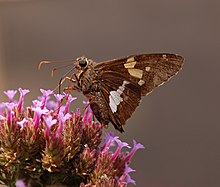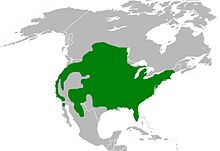Epargyreus clarus
| Silver-spotted skipper | |
|---|---|
 |
|
| Topview | |
 |
|
| Sideview | |
|
Not evaluated (IUCN 3.1)
|
|
| Scientific classification | |
| Kingdom: | Animalia |
| Phylum: | Arthropoda |
| Class: | Insecta |
| Order: | Lepidoptera |
| Family: | Hesperiidae |
| Tribe: | Eudamini |
| Genus: | Epargyreus |
| Species: | E. clarus |
| Binomial name | |
|
Epargyreus clarus (Cramer, 1775) |
|
 |
|
| External identifiers for Epargyreus clarus | |
|---|---|
| Encyclopedia of Life | 184797 |
| Also found in: | |
Epargyreus clarus, the silver-spotted skipper, is a butterfly of the family Hesperiidae. It is claimed to be the most recognized skipper in North America.
The wingspan of an adult is 43–67 mm. The adult has translucent gold spots on the forewings and silvery bands on the hindwings.
The caterpillar's head is large and brown with two orange dots mimicking eyes. It has a long, narrow, green body.
The adult silver-spotted skipper occurs in fields, gardens, and at forest edges. It ranges from southern Canada throughout most of the United States to northern Mexico; it is absent in the Great Basin and western Texas.
Adults fly throughout the warm part of the year. They have one brood per year in the North and West, two in the East, and three or four in the Deep South.
Females lay single eggs on the caterpillars' host plants.Young caterpillars fold leaves to make shelters, and older ones stick leaves together with silk. They overwinter as chrysalids.
The larvae feed on legumes, many trees, and shrubs but also some herbaceous plants. Their hosts include:
Adults almost never feed on yellow flowers. Among their favorites are:
...
Wikipedia
